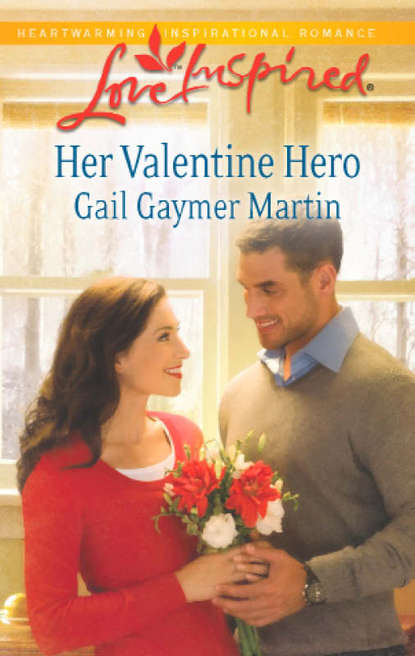
Полная версия
A Hopeful Harvest
She hid her reaction and started to refuse, but he dropped his gaze to CeeCee before lifting it to her grandfather. “You’ll do better here and I’ve run a lot of spray arms in my time. Is the tank full?”
She nodded.
“How far did you get?”
“Through the Red Delicious.”
“I’ll start at the Granny Smiths, then. They’ve finished the demo removal and I’ve got nothing going on the rest of the day.”
Why was that? she wondered.
But she didn’t wonder long because it made sense. “If you really don’t mind, that would be wonderful. Then I can get the tractor back to the Bakers and start harvesting tomorrow.”
“Glad to help.” He’d lost his army cap somewhere and was wearing a faded baseball cap with USA in bold letters on the front. He tipped it slightly. “You know where I’ll be.”
He didn’t just walk to the tractor. He strode as if spraying her trees was the most important job ever given.
CeeCee jumped into her arms. “I’ve got so much to tell you guys because school was so much fun!”
Her genuine delight eased Libby’s school concerns.
“Tell me all about it. Gramps, how about if I make you a cup of tea and you can rest awhile?”
“I won’t mind it a bit. These feet are tired of standin’ watchin’ others do the work, but it was some quick work, wasn’t it? I told your grandmother that policy would be just fine. I told her.”
“You did.”
She’d read that green tea helped cognition. She’d read a lot of stuff, but nothing seemed to help Gramps’s hastening decline. She brought him the tea and turned the TV on softly. He was asleep in five minutes. By the time Jax rolled the tractor back up the access drive, she had a pot of red sauce ready and water simmering for pasta.
He knocked at the side door. CeeCee rushed to let him in. When she went to hug him, he held back. “Not with spraying clothes on, little lady. Chemicals and kids don’t mix.” He ignored CeeCee’s look of disappointment and called up the side stairs. “Give me your car keys and I’ll run the tractor up the road, then bring your car back.”
She crossed to the stairs and looked down, right into his eyes. A gaze that hinted at melancholy, much like hers. “You don’t have to do that. You’ve done so much already.”
He smiled. “I think a plate of pasta and whatever sauce you’ve got cooking makes it even. Don’t you?”
Having him stay for supper? Um, no. Small-town single mothers and stray men were not a good mix.
“You can have supper with us? Like, tonight?” CeeCee didn’t hug him, but she grasped his hand. “That would be so nice! Wouldn’t it, Mommy?”
What could she say without being rude? She wiped her hands on a dry towel, stepped down and handed him her keys. When she did, her hand brushed his. The lightest touch. So why did that minimal contact send her heart beating stronger again? Faster? She drew her hand away quickly. “We’d be honored to have you to supper. Of course.”
“I don’t have to stay.”
He was graciously offering her a way out of the predicament. Because he sensed her hesitation? Or because he disapproved of how she handled Gramps?
Either way, he’d gone the distance for them today. “Please stay.” She lifted her eyes to his as he took a step back toward the gravel drive.
Big mistake. Because she was pretty sure when she looked into his eyes, she saw his soul. A soul that was just as fractured as hers. Then the glimpse was gone, replaced by a smile that seemed well practiced. She knew because she had polished one of those smiles herself.
“Mighty obliged, ma’am.” He winked. Then he climbed back onto the tractor, whistling. She couldn’t hear the whistle when he started the old John Deere up, but she’d recognized the tune. Gramps used to sing it to her twenty-five years ago, when she’d dash in and around the apple trees. It was their song.
She hummed it now.
Gramps woke up as she put the pasta into the boiling water a few minutes later. He grinned as he came into the kitchen. “Remember how we used to sing that when you were a little girlie?”
“I sure do.”
“And then you went off and started sittin’ under apple trees with other folks. Not listenin’ to your grandma and me.”
Every now and again he’d start scolding. It took everything she had not to take offense. He wasn’t wrong. They’d tried to warn her about her choices. In a search for someone to love her, she hadn’t listened, and every now and again Gramps brought it up. “We all make mistakes, Gramps. Look, I made red sauce. Your favorite.”
Trying to change the subject didn’t work today. “I told ya. Your grandma tried to talk sense into ya, but kids don’t like to listen. We saw what happened with your mother and we didn’t want the same thing to happen with you.”
She set down the spoon and crossed the room. “I learned my lesson. Now I’m here and we can leave all that behind us. Can’t we?”
His brow drew down. His forehead wrinkled. He seemed to be grasping for something to say, but Jax walked in the side door right then.
He seemed to size up the situation quickly. “Sir, can I take you for a short walk to the barn sites? I need your opinion on a couple of things.”
“Me? Oh. Sure!” The transformation of Gramps’s face was almost instantaneous. “We’ll be gettin’ the apples in the barn soon, if I can get this girl on some kind of proper schedule.”
Kindness deepened Jax’s expression when he looked at her. Then he took Gramps’s arm and helped him down the three steps to the side door. “Still smells real good in there.” He flashed a quick smile her way, but it was a smile tinged with compassion. “How much time do we have?”
“Eight minutes until the pasta’s done.”
“We’ll be back.” He led Gramps outside.
She breathed.
Minute to minute, she wasn’t sure what Gramps would say or do. Remember or forget. She would seek Mortie’s advice once Gramps and CeeCee were asleep. Mortie wouldn’t mind her calling after hours. She’d been a good friend to Libby’s mother when they were young, before her mother took a walk on the wild side. Mortie would advise and counsel. Never blame. And Libby could use a dose of that wisdom right about now.

Worn down.
That was what he saw when he looked into Libby’s dark blue eyes. Eyes that matched the Central Washington sky.
Was she worn down by life? Circumstances? The current situation?
Maybe all three. Which meant he needed to keep his distance like he did on every job. Trouble was, this job was different. If he stayed to help rebuild that barn, he’d be here every day, wanting to help because something in her called to him. The pain she tried to hide. The self-confidence she pretended to have. The hurt he’d seen from something the old fellow said.
Grandma Molly had been the same way. She’d gotten downright nasty at times, and he’d been one of the few people who saw beyond the curt words. The hurled insults. Because he knew it wasn’t her saying those rude things. It was the disease.
He should leave this job to someone else. The family foundation could have the whole thing done as an act of mercy, but then she’d know that it was Central Valley Fruit footing the bill and might refuse their help.
“Them apples, them first ones, they’ve got to come off those trees now.” Cleve gripped Jax’s arm with one hand and pointed with the other. “They should be in the barn, and out on the sales tables out front. What’s that girl been doin’?” he grumped, then stopped dead to rights. “Where’d the barn go?”
The old fellow’s angst made Jax’s decision. Yeah, the foundation could rebuild the barn but they couldn’t get to the root of the problem. The old man’s declining state.
He could. If nothing more than giving her some respite as things got worse. He’d faced this disease with his grandmother with a host of help, professional and family.
Libby had no one but herself and her little girl and the nurse from the local agency. Jax knew the score. This was a 24/7, 365 kind of illness. Two hours a day, three times a week wasn’t going to cut it.
He’d see it through.
He’d try to keep his distance from Libby Creighton and her precious daughter. He’d stay civil and kind. That was what they needed right now. Strong hands, a strong back and someone to help with Gramps. He readdressed the orchardist’s concern about the barn. “We had a wicked windstorm yesterday, sir.”
“Call me Cleve. We’re friends, ain’t we?”
“I’d like that. Well, Cleve, we had a bad windstorm, as bad as I’ve seen it get, and it took down the big barn and the smaller one, too. So we got them cleaned up today, and we’ll have supplies brought in to start rebuilding soon.”
“Supper’s ready.” CeeCee dashed down the drive to meet them. “Mommy said to tell you.”
Cleve glanced back as they moved toward the house. “Them big trucks came, right?”
Jax encouraged the memory. “They did. They cleared the site for us.”
“I told Mother. I told her our insurance policy was plenty good enough and she argued to beat the band but I stood my ground.”
“You did just fine, Gramps.” Libby shot Jax a look of gratitude as he helped Cleve up the stairs. “It all worked out.”
“Won’t she be surprised when she gets home and sees I was right all along?” Cleve almost preened at the thought. “She’s smart as a whip but there’s no flies on me. If you know what I mean.”
“That means you’re smart.” CeeCee offered the old fellow an adorable grin. “You told me that and I believe it, Gramps.”
Cleve’s smile grew. He took a seat. For the moment, he was happy. Satisfied. But when Jax glanced back at Libby, he read the emotions there.
She knew it wouldn’t last. She understood. But how could one woman handle an elderly, sometimes contentious, dementia patient and run an apple orchard at harvest time? With a little girl who loved to run around?
She couldn’t.
But she could with his help, and that made it a no-brainer. As long as he could keep his distance.
“Can you say grace, Mr. Jax? Please?”
He froze in place, wondering how to reply.
Libby laid one hand on Cleve’s and one on his, and gave a soft blessing. A sweet note of thanks. Then she looked up and met his gaze. Held that look longer than she needed to.
She saw him.
The real him.
He sensed it in her eyes, in her touch, in the prayer. Somehow she glimpsed the soldier behind the civilian facade. The soulfulness in her gaze reached out to him.
His heart sped up even though it shouldn’t. Even though it couldn’t.
She held his gaze one beat longer, then smiled.
When she did that, he realized something else. She might be helping him as much as he helped her.
And that wasn’t a thought he dared to contemplate.
Chapter Four
“The town won’t approve a building permit to replace the barn until they have a plan in front of them,” Jax told her the next morning. He tipped his army cap to block the angle of the morning sun as they waited for CeeCee’s bus. “I didn’t know what you had in mind, because there are several ways to go. We should sit down and talk about it. Get a plan drawn up.”
Should she? Libby wondered as CeeCee’s bus pulled to a stop in front of them. She kissed CeeCee goodbye and waved until the bus was up the road while she considered the question.
Did it make sense to rebuild the barn if she was going to sell the orchard?
It didn’t. Yet it felt wrong not to, as if she was shrugging off part of her family’s past. It couldn’t be built in time for the current harvest, so what was the point? “I need to really think about this,” she told him. “There are multiple issues and we’re in a time crunch. I’m in danger of having the Galas overripen, and no place to put them. I asked the Bakers if they wanted to buy them wholesale and market them with theirs, but it’s a bumper crop year and they’re overloaded. Who would ever think a great harvest was a bad thing?”
“A bumper crop year is perfect for cider production,” he noted.
“Gramps was the only one who could get the press to work,” she told him. “And the press was in the small barn that no longer exists. When I was a little girl they would buy tons of apples from the other farms to make cider. It was amazing to see. Now most of the apples are produced by the major fruit producers and Gramps stopped pressing cider when it became too difficult to find enough affordable apples. Did you know that our state exports over thirty percent of the apple crop now?”
He hesitated momentarily. “That bothers you?”
She answered as she moved toward the house. “No. It’s smart marketing. There’s only so much that can be used in one area or even one country. While that drives up the retail prices, it doesn’t have the same effect on wholesale prices. People expect us to be lower priced without the middleman but it’s a narrow profit margin.”
Jax didn’t hide his surprise quickly enough and she frowned. “You didn’t think I knew about margins and break-even levels and median production, did you?”
He made a face. “Busted.”
“I have a bachelor’s degree in supply-side logistics and merchandising, but when I got my degree I realized that I didn’t care as much about shuffling goods as I did about the presentation of goods. The final package. But one feeds the other, I guess.”
“The producer cares about one and the retailer rules the other.”
“Exactly.” She paused by the door and faced the now-empty barn site before addressing him again. “I want to take a couple of days to figure things out. About the barns, the rebuilding, the deductibles, what makes sense in the long run. I’m not fooling myself about Gramps’s condition.” She lifted her gaze to his. “I don’t know if it makes sense to put all that money into this property and then walk away. And if I don’t do it, I’m putting another nail in the farm’s coffin by inaction, which will limit my choices even further.”
He started to speak but paused when she held up a hand. “Give me three days. I’ll pray. I’ll sound it out with a few others around town and gather some advice. I’m always better when I have the facts surrounding me.”
“Fair enough.” He motioned toward the orchard. “I’ve got some bins being dropped off. We’ll get the early apples off the trees this week. I rented some cold storage space just outside town.”
She frowned. “That’s pricey.”
“The insurance had a clause for rental facilities as needed. It wasn’t a generous amount, but it will cover a couple of weeks. Enough to buy you a little time.”
He’d seen a need and developed a plan, which made him seem even more ideal because he’d not only saved her time, he might have saved the early apples. “That’s perfect.”
He was carrying a laptop bag over his shoulder. He motioned to it. “Can I take a spot on the back porch and run some figures? If you have Wi-Fi, that is.”
“We do and yes. Unless you’d be more comfortable inside?”
He headed for the shaded porch. “Too nice a day. When I was a kid, a day like this was called Washington Perfect. It got to be a saying with my brothers when something went right. We’d look at each other and say, ‘Washington Perfect.’”
“How many brothers do you have?” she asked, but the moment she did, he went quiet. Then he answered normally.
“Two. One older, one younger.”
She was going to ask if they lived locally, but he was already rounding the corner of the house. Just as well. She didn’t need to know personal stuff about him. Nor him about her. She was okay keeping her marriage to Keith to herself.
You’re afraid he’ll think you were stupid.
She swallowed hard as she climbed the short flight of stairs to the kitchen.
Every time she looked back on the past seven years, she felt stupid. A four-year college degree that she’d barely used, a horrific mistake in her choice of husbands and letting things go long enough to end up homeless. A smart woman would never put an innocent child in those conditions.
“There’s my girl!” Joy heightened Gramps’s voice when he saw her come through the door. “Come to visit, have you? I’ll get Mother. We can set a spell. Okay?”
She couldn’t squash his hope and re-explain their circumstances, how she was living with him and that he had a great-granddaughter he recognized some days and not others. “I’d like that, but first I’m going to take care of these dishes, okay?”
“She left them to sit there?” He stared into the kitchen, frowning, because Grandma had always taken pride in a clean kitchen and a job well-done. Libby saw the moment realization hit him. His face dimmed. His eyes lost their sparkle. He didn’t say a word. He simply shuffled away to his chair in the front room. He sat and studied the room around him, his eyes darting from this to that.
He was trying to memorize it, she realized.
He was studying things to commit them to memory. Within minutes he would forget again, and these brief moments when he tried to regain a hold on reality hurt the most.
Oblivion came with an air of peace. Realization brought nothing but frustration to a beloved man, but how could she justify hoping for oblivion when he was striving to maintain what little mental capacity remained?
“Keep things as structured and as much the same as you can,” the doctor had advised, and she’d been trying to do that, but life had been messing that up lately.
A soft tune came through the open window. Jax whistling “Don’t Sit Under the Apple Tree” like he’d done the other day.
Gramps’s song.
She took a glass of tea in to Gramps. He greeted her as if she was a waitress in a diner, and when he was settled, she decided she didn’t need anyone’s advice about the barn.
She was savvy enough to know that easing an old man’s last months was worth the cost of a mortgage to pay the balance on the barn. With land prices at record-high levels, she should recoup the investment when she sold the farm eventually. She’d stop by the local bank and get things in motion. They’d want a plan, too, most likely.
She used the back door to access the small porch facing northwest. Jax looked up immediately. The warmth in his expression made her heart stutter again.
She reined in her reaction, then indicated the sloping hills and rugged Cascades beyond them. The arid mountains were brown and bare in spots, a stunning difference to the lush valley below. “We don’t do much sitting out here during the cold months.”
“Or the front porch, either, I expect, if we get a whip wind.”
“And yet we get enough pleasant weather to make a porch seem like something to come home to, don’t we?” She crossed to the open post, gazed out, then turned her attention back to him. “I know I said I’d wait, but I decided I want to replace the barn. How do we pick plans to present to the board? Do I need to hire an architect?”
He motioned her closer. “I was just looking at some pole barn packages. You can go old-school with lumber and we can build a wooden barn, but the new pole barns are beautiful and cost-efficient.” He’d pulled up a web page of an appealing barn with overhangs on two sides. “I thought the porch covers would be good for outdoor displays. Protection from sun and rain. This model is lower and tighter with no wasted space and you could have a cooler big enough for the small forklift to bring bins in and out.”
“It’s beautiful.”
He nodded. “They’ve come a long way with these. You could go bigger, but I don’t think you need to. Room to store things in the back, room for a produce-type store up front and plenty of refrigerated space.”
“How do we get plans and how do we present them to the building inspector?”
“The plans are as easy as pressing a button,” he told her. “Do you have a printer?”
“In the front room, yes.”
“Wi-Fi enabled?”
She rolled her eyes. “It’s supposed to be but isn’t, so I keep a cable attached.”
He stood, laptop in hand. “Let’s print this up and get the ball rolling.”

She stepped back.
He didn’t want her to, because having her look over his shoulder—her long hair brushing his cheek as she leaned closer to check out the barn’s stats—was too good to resist.
He was drawn to her. No denying that.
Her pretty hair smelled of apples and spice. Did she do that purposely, because of the season? Or did she just like the shampoo?
He wanted to know that and so much more, which meant he needed to put the brakes on. Steer clear. Trouble was, he didn’t want to. Just as he was thinking those dangerous thoughts, three cars rolled into the driveway. An unlikely looking crew of people piled out. Gert Johnson spotted them and came forward the way she always moved when she wasn’t driving a bus. Quickly. “We’re here to help, Libby.” She motioned to the six local bus drivers gathering around her. “You point us in the right direction and we’ll get things going because when Gert Johnson says she’ll do somethin’, she does it, and the same goes for this motley crew.”
“I’ll find the printer,” he told Libby once he greeted the newcomers. “Then I’ll take folks into the orchard and we’ll get going on those Galas. How long have you got?” he asked the group, and Slim Viney spoke up first.
“We’ve got afternoon bus runs at two forty, so we have to leave here by two fifteen to get back in time. And we’ll be doing this every day until the job’s done. That’s what folks do in Golden Grove.” He aimed a significant look in Libby’s direction. “They shore each other up when the chips are down.”
“Sure do!” said Dora Donaldson, a stout but lively woman who helped run the church calendar for Golden Grove’s oldest church. Her great-grandfather had been one of the first settlers this side of Quincy, and he’d worked side by side with Jax’s great-grandfather a long time ago. Jax used his middle name as a surname here. If he uttered the name Ingerson, his relationship to CVF would be instantly known. Loved by some, hated by a few, his family had invested time and money to grow their business over four generations. He wasn’t one bit ashamed of that. He simply wanted to fly under the radar for a while.
His conscience scoffed as he went inside to hook up his laptop.
Three years and counting. That’s a long penance by anyone’s standards.
Would it ever be long enough when four of his men drew a death sentence that day? A dull throbbing began to take root at his temples. A throbbing that could explode into a massive headache.
Sit. Breathe. Do the relaxation techniques you’ve been taught. You can interrupt this cycle.
But he had no time to sit and do the breathing exercises to relax the muscles that clenched when memories came flooding back. He needed to get the barn plans printed and get into that orchard. He’d offered his help. Painful head or not, he’d made a promise. Now he had to keep it.
He frowned, crossed to the slim desk in the narrow hallway, hooked the laptop to the printer, printed a double set of plans, then checked on Cleve.
The old man had dozed off in his chair. His food was untouched. Jax debated leaving it there or taking it back to the kitchen. In the end, he left it. Cleve might eat when he woke up or might forget to eat at all, another disease conundrum. He started to head out, but a group of photos on the nearby wall caught his eye. He moved closer.
A middle-aged couple snuggled a little girl who looked a lot like CeeCee. Bright blue eyes laughed into the camera while a younger Cleve’s salt-and-pepper hair lay against the little girl’s golden curls. His wife seemed amused and delighted by something. Their antics, maybe? And this picture was flanked by a half-dozen other pics of Libby at various ages. The grandparents’ love for her was obvious. He also noted a conspicuous lack of parents in the photos.











